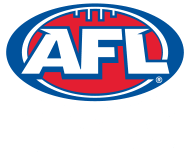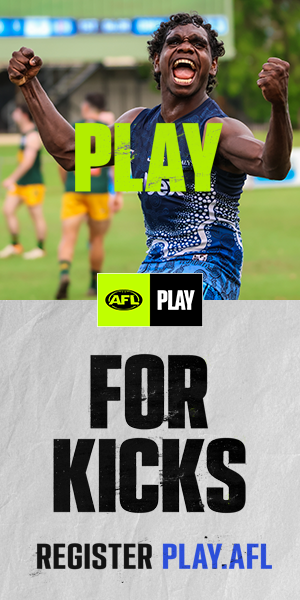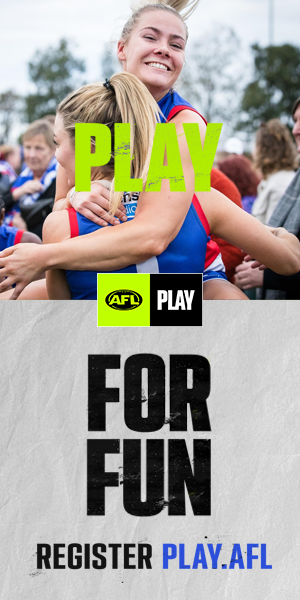John Finn is in his 50th year with the West Townsville Football Club, now known as the Thuringowa Bulldogs. He played in five senior premierships over 18 years and was a premiership coach. He was a best and fairest winner, a Townsville and North Queensland representative and for 28 years was a senior club administrator. He founded the club’s Masters program and played for 12 years. Yet if you ask locals about his biggest legacy, the answer is ‘none of the above’.
It is Riverway Stadium, a showpiece venue modelled on the Gabba that is the home of Australian football and cricket in Townsville. A stadium with a 1,000-seat grandstand, total capacity of 10,000, and the capacity to get bigger and better with the installation of television-standard lighting.
It is a result in no small way to the visionary and hard-working Finn, who sat like a proud father among a crowd of 7,243 on Saturday afternoon, 15 June 2019 as the Gold Coast SUNS played St. Kilda at Riverway Stadium for AFL premiership points, and rightly so. It was a momentous occasion.
Riverway, or Tony Ireland Stadium as it is also known, located on the foreshore of the Ross River, is a long story that goes back to the days of Pioneer Park. Located on the same site, it was home to Australian football, tennis, cricket, soccer, hockey, scouts, girl guides, water-skiing and junior rugby league in Thuringowa.
“Each sport had its own clubhouse and patch of grass and had to look after it. Nobody owned anything – it was a whole bunch of small operations doing their own thing. So the Thuringowa Council got everyone together and in 2003, threw up the idea of a multi-purpose venue for all of us,” Finn explained.
“It was a big decision because it meant handing back our permit to occupy – and you know when you do that you never get it back. But we looked at everything and decided ‘yes – it’s a good idea’ – so we got on board. The stadium was built on the same location where the Bulldogs trained and played and is now managed by the Townsville City Council.”
Significantly, Suburban Parks Cricket Club was the only other sport to see the benefits and commit to the project. Seventeen years on, Riverway is a wonderful regional football and cricket stadium, complete with function and meeting rooms and all else that is necessary.
“It meant we had three years in the wilderness while it was being built. We trained at rugby league grounds, a cricket oval, touch football fields, a school oval, or anywhere that would take us, so we took a real hit as far as growth was concerned. But sometimes that’s the price you pay, and nobody has any regrets now,” Finn said.
On New Year’s Eve 2007 Riverway was opened, hosting a crowd of 10,024 for a domestic Twenty20 cricket match between Queensland and Victoria. Victoria, the defending champions, made 7-187 batting first, thanks chiefly to 43no off 28 balls from Andrew McDonald, later to become the Australian coach, and bowled out Queensland in 19.3 overs for 140. Jimmy Maher top-scored with 44 off 35 balls as McDonald took 3-20.
Football returned to the stadium in 2008, highlighted by an interstate clash between Queensland and Western Australia. The Sandgropers, with a 17-year-old Daniel Rich running rampant off half back just months before he was drafted by the Brisbane Lions, won 24-20 (164) to 14-7 (91).
In 2013-14-15 the Gold Coast SUNS played pre-season games against North Melbourne, Brisbane Lions and Geelong at Riverway after the stadium had hosted a four-day first-class cricket match Pakistan A v Australia A in June 2009 and games in cricket’s Under 19 World Cup in August 2012, before it became Australia’s 10th ODI cricket venue in November 2014 when it hosted Hong Kong and Papua New Guinea.
For Finn, the big day was the first AFL match for premiership points in 2019, when the SUNS led by 21 points at quarter-time and at every change before the Saints got home 11-14 (80) to 11-10 (76) after two late goals from Jack Billings. St. Kilda’s Nick Hind, now at Essendon, was Riverway’s first AFL debutant as Billings took three Brownlow Medal votes for 33 possessions and two goals. David Swallow earned two votes for his SUNS-high 31 possessions, Seb Ross’ 31 possessions for St. Kilda was worth one vote and St. Kilda’s Tim Membrey was the leading goal-kicker with three.
Finn, who enjoyed every minute of it sitting behind the goals at the river end with a bunch of mates, was later recognised with a plaque in the main function room acknowledging the critical role he played in the stadium’s development from conception to realisation.
It was a special highlight in a football career that began with the West Townsville Under 15s in 1974. After a Reserves premiership in 1977, he played 258 senior games from 1978-95, winning the flag in 1980-90-91-92 and the 1987-88 summer season, when the Bulldogs went through undefeated. He coached the club in 1984, the summer season of 1984-85 and in 1992 when they were premiers.
Predominantly a ruck-rover/wingman/half back, he won the West Townsville best and fairest in 1984 and played countless times with distinction in the Townsville and North Queensland representative sides. In 1983, when the NQ side played in a QAFL Statewide Cup, he travelled to Rockhampton, Cairns, Mackay, Mt Isa, and the Gold Coast. One memorable match in Cairns was against a Sandgate side coached by Alex Jesaulenko, when NQ rolled the Hawks to reach the semi-finals.
In 1999, three years into retirement but still keen to have a kick, he discovered ‘Super Rules’. Having heard from the south about a game that was basically ‘football for old fellas’, he thought ‘we should do that’. So he did. First in Townsville and later to Cairns and Mackay. He went to his first carnival for what is now ‘Masters Football’ on the Gold Coast in 2001 and his 12th and last back on the Gold Coast in 2016. He was 58. Even today, after having both knees replaced in 2017, he enjoys an occasional kick and a run around with anyone keen.
A plumber for the first 22 years of his working life, he’s now 26 years in his second job as an inspector/manager with the Queensland Workplace Health & Safety Department of the State Government since 1997. And through it all he’s put his hand up whenever a job needed to be done at the Bulldogs. He was club secretary for 10 years in three stints from 1980-81, 1998 and 2016-22, and president for 18 years in three stints from 1987-88, 1998-2001 and 2003-14. He saw his beloved club win eight flags while he was at the helm in 1999-2000-01 and 2010-11-13-14-16.
Now 64, Finn is a Life Member of the Bulldogs, AFL Townsville and AFL Townsville Masters, and is known locally for two favourite sayings – ‘a football season lasts for only a few months but friendships last forever’ and ‘don’t bounce the ball on the concrete’.
He has been married for 41 years to wife Eva and is father to 32-year-old Matthew, who lives in Sydney, and 30-year-old Deanna, who is married to North Queensland Cowboys rugby league star Kyle Feldt. Not just any old Cowboy – a Cowboy even AFL people may know. In the 2015 NRL Grand Final against the Brisbane Broncos, he scored a try to level the scores as the siren sounded. Johnathan Thurston’s sideline conversion to win the premiership hit the post, but shortly after a towering Feldt kick forced a mistake from Broncos halfback Ben Hunt and led to Thurston’s title-winning field goal.
It has been said in jest that such has been the enormous contribution to Townsville football of the mild-mannered, get-things-done man they call ‘Finny’ or ‘’Dorsal’ that even the ‘enemy’ want to get on board. In reality the biggest recognition came in 2023 when the Bulldogs established a Hall of Fame. There were four inaugural inductees and only one who went straight to Legend status – John Finn.



























































